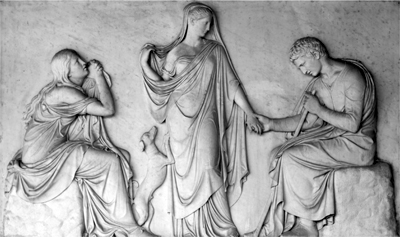

The author and publisher have provided this e-book to you for your personal use only. You may not make this e-book publicly available in any way. Copyright infringement is against the law. If you believe the copy of this e-book you are reading infringes on the authors copyright, please notify the publisher at: us.macmillanusa.com/piracy. CONTENTS I. III. IV. V. VI. VII. VIII. IX. X. XI. XII. XIII. XIV. XV. XVI. XVII. XVIII. XIX. XX. XXI. XXII. XXIII. XXIV. XXV. XXVI. XXVII. XXVIII. XXIX. XXX. XXXI. XXXII. XXXIII. XXXIV. XXXV. XXXVI. XXXVII. XXXVIII. XXXIX. XL. XLI. XLI.
TO Nicola Gardini AND Shirley Hazzard INTRODUCTION POET OF PROBLEMS Leopardis Canti , one of the most influential works of the nineteenth century and one of the great achievements in Italian poetry, is not a conventional collection of pooems. A mere forty-one compositions make up the Book of Life and Thought of Italys first modern poeta series of beginnings, of constantly evolving experiments in style and thematics, obsessively reworked and reorganized over a lifetime. They include both the most public and the most personal work of a writer who also spent his enormous if not inexhaustible energies on countless other literary endeavors: classical translations, philological studies, and the editing of texts and anthologies; philosophical dialogues and social criticism; and the enormous notebook of ideas and impressions, the Zibaldone , which is the seedbed of all of Leopardis work. Among the canti are the first truly modern lyrics, the wellspring of everything that follows in the European poetic tradition. But they are not merely evocations of private suffering and grief, for the poet not only had feelings to sing about but things to say, as one critic has put it. Leopardis complex structuring of the Canti has been ably dissected and theorized, A classicist by education and mental inclination, Leopardi was severely critical of a world that had added to the comforts of religionwhich he rejected as a young manan equally credulous and self-deluding new faith in the ability of scientific knowledge to ameliorate the essentially tragic nature of life.
He grew up in the small, backward town of Recanati in the papal Marche, in a household of ultramontane reactionary Catholic nobles. His father had amassed a great library stocked not only with the church fathers but with all of Greek and Latin literature, which he read and studied so intently and voraciously that by the time he was fifteen there was nothing more for his tutors to teach him and he had seriously compromised his health. Instead of leading him to holy orders, as his parents had hoped, his studies exposed him to illicit Greek sensuality and stoicism. He yearned for love, and for liberation from the clutches of his family, for the place in the great world that his great brilliance seemed to promise him; and indeed his philological and literary work earned him widespread fame at a young age. Yet he was always financially dependent on his parentsa benevolent but uncomprehending and rigidly conventional father and a withholding, judgmental mother (maternal imagery in Leopardis poetry is usually negative)and he never really won full emancipation from them. His sallies forthto Rome, to Bologna, to Florence and Pisahabitually ended in defeat, in a return to Recanati.
He learned that he was unsuited for worldly life, just as he found that his amorous forays met with the indifference or disdain of the women with whom he became infatuated, his poor health and unprepossessing appearance no doubt contributing substantially to his sense of isolation and hopelessness. It was only in his last years, when he joined forces with a young Neapolitan, Antonio Ranieri, that he managed to establish an independent life in Naples. Leopardis first, adolescent writings were works of classical philology, scientific inquiry, and obligatory religiosity, but by the age of twenty, after apprenticing himself to his calling by way of translation and imitation, first of Horace and other canonical Latin writers and then, significantly, of the prohibited Greeks, he began to embark on original work of several kinds. His social ideas found voice in exhortatory canzoni, public poems in which he called on the Italians to reclaim their cultures forgotten greatness and liberate themselves from the political oppression of the post-Napoleonic Restoration. (This made him a forefather of the Risorgimento and to other national liberation movements of the nineteenth century.) At the same time, he was inscribing into the Zibaldone copious profound and original reflections on his broad and deep studies in all branches of knowledge, which would remain unread until they were finally published at the very end of the century. And, more or less simultaneously, in the poems he called his idylls, he was writing about his own anguish in an entirely direct and new poetry that was to become the basis for his enduring international reputation.
Here is what is arguably the first of the idylls, written when the poet was barely twenty-one: To the Moon O graceful moon, I can remember, now the year has turned, how, filled with anguish, I came here to this hill to gaze at you, and you were hanging then above those woods the way you do now, lighting everything. But your face was cloudy, swimming in my eyes, thanks to the tears that filled them, for my life was torment, and it is, it doesnt change, beloved moon of mine. And yet it helps me, thinking back, reliving the time of my unhappiness. Oh in youth, when hope has a long road ahead and the way of memory is short, how sweet it is remembering what happened, though it was sad, and though the pain endures! Everything that will follow in two centuries of Western lyric poetry is here: a new self-consciousness of the writers alienation from life, with the constant companionship of pain and the consolation of the power of memoryall evoked with unmediated directness and haunting expressive beauty. This is the Leopardi we think we know, the voice of suffering self-knowledge and lovely torment. But it is important to understand that the different modes of Leopardis poetry, the lyric and the didactic, the pastoral and the historic, the metaphoric and the argumentative, derive from the same vision, express the same spirit in diverse ways.
Even Leopardis most articulated political exhortations are studded with classically inspired similes and lyric interludes that illustrate his ideas poetically; while the poems we read as pure lyrics likewise need to be seen as embodiments of his ideas, with the didacticism largely though not entirely suppressed. The rhetoric of the early canzoni derives from a received, elevated style that had dominated Italian verse since the Renaissance; the verse epistle to Carlo Pepoli and the Palinodia, too, exhibit what the idealist philosopher Benedetto Croce called the argumentative non-poetry that also finds its way into Leopardis testament, La ginestra, which many have seen as the great poem of Italian national identity. But the mind that was analyzing and deriding the headlong liberal belief in unending self-improvement and societal betterment having failed to make a single person on earth happy, they abandoned man and tried to find a universal bliss; and having found it easily, out of many wretched and unhappy persons made a joyful, happy race: is the same mind that is preoccupied in his intimate lyrics with hisand ourinability to achieve serenity. Each creature born will be / simply unhappy, in whatever era by universal law: our natural mere unhappiness, about which nothing can be done, is the subject and stuff of his most personal lyrics, a distillation of a vision of life conditioned by Greek philosophy and confirmed by personal experience of the omnipresence of pain, offset only by the power of illusions to conceal it from us for a time. Leopardis ultimate cast of mind, then, is disabused and, at its darkest, utterly hopeless. The trajectory from his best-known idyll, Linfinito, to its mirrorpoem, A se stesso, is the trajectory from a stunned contemplation of the mysterious sea of beingwhich arouses an amorous desire to lose oneself in existenceto disgusted resignation and withdrawal from life.


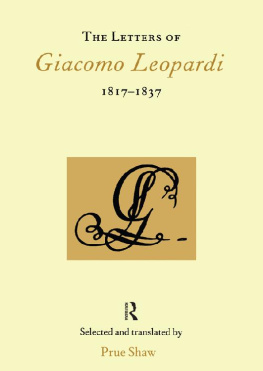
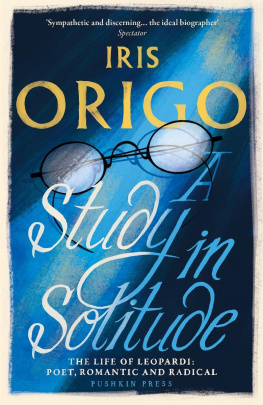
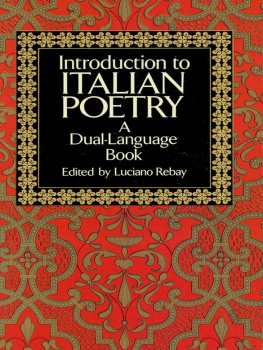

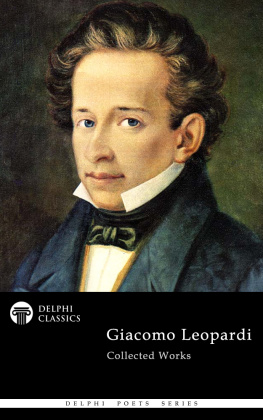
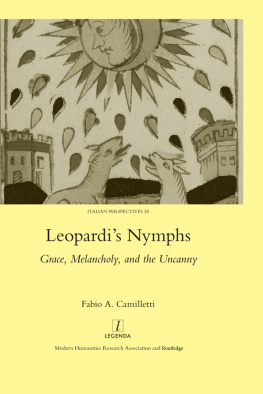
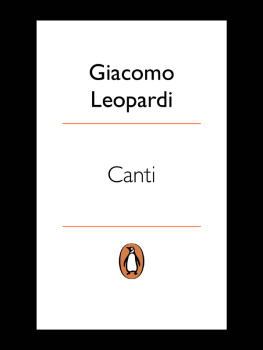
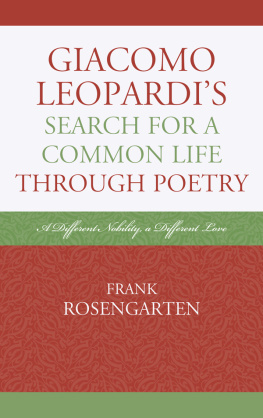
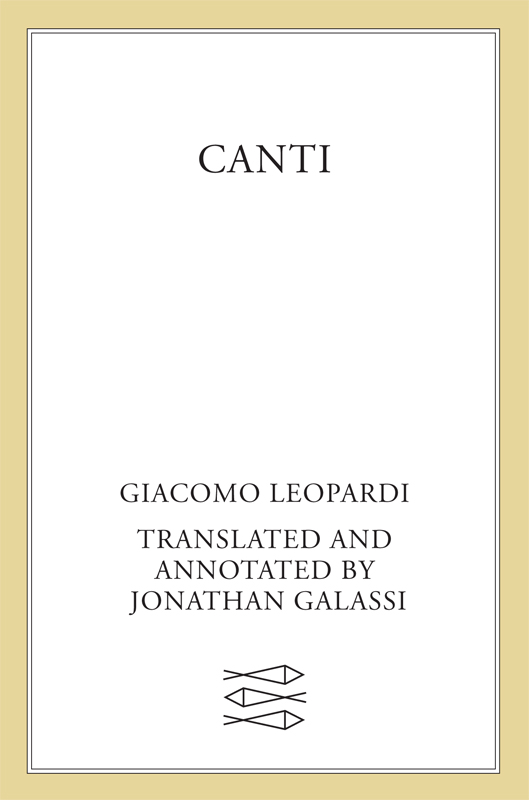

 The author and publisher have provided this e-book to you for your personal use only. You may not make this e-book publicly available in any way. Copyright infringement is against the law. If you believe the copy of this e-book you are reading infringes on the authors copyright, please notify the publisher at: us.macmillanusa.com/piracy. CONTENTS I. III. IV. V. VI. VII. VIII. IX. X. XI. XII. XIII. XIV. XV. XVI. XVII. XVIII. XIX. XX. XXI. XXII. XXIII. XXIV. XXV. XXVI. XXVII. XXVIII. XXIX. XXX. XXXI. XXXII. XXXIII. XXXIV. XXXV. XXXVI. XXXVII. XXXVIII. XXXIX. XL. XLI. XLI.
The author and publisher have provided this e-book to you for your personal use only. You may not make this e-book publicly available in any way. Copyright infringement is against the law. If you believe the copy of this e-book you are reading infringes on the authors copyright, please notify the publisher at: us.macmillanusa.com/piracy. CONTENTS I. III. IV. V. VI. VII. VIII. IX. X. XI. XII. XIII. XIV. XV. XVI. XVII. XVIII. XIX. XX. XXI. XXII. XXIII. XXIV. XXV. XXVI. XXVII. XXVIII. XXIX. XXX. XXXI. XXXII. XXXIII. XXXIV. XXXV. XXXVI. XXXVII. XXXVIII. XXXIX. XL. XLI. XLI.